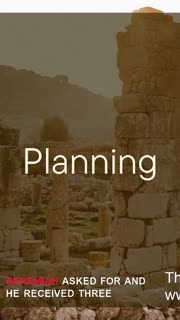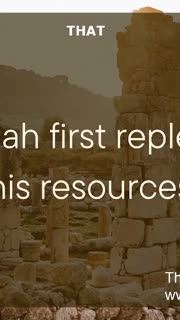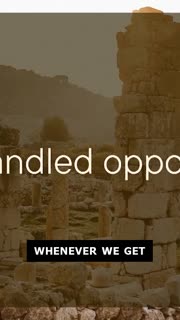Building God's Kingdom: Tools for Faithful Action
Devotional
Sermon Summary
Bible Study Guide
Sermon Clips
### Quotes for Outreach
1. "Prayer isn't reserved for a Wednesday night corporate prayer. Prayer is the lifestyle of the believer. And as we move into Nehemiah chapter 2, can I encourage you, can I give you a little bit of homework? Just a little bit. I want you to read Nehemiah, but I also want you to read Ezra and Esther. Because all three of those books are happening around the exact same time." [03:31] (20 seconds)
2. "If we'll let go of fear, we could do so much more. There was a great book written years ago called Who Moved My Cheese? Anyone ever read that book? Who Moved My Cheese? It's a great book. And the author asks this question. What would you do if you weren't afraid? What would you do if you weren't afraid? He points out that fear often keeps us from taking the steps we know we need to take and fear can paralyze us." [13:15] (25 seconds)
3. "If we'll just come to the place where we can say, hey, I'm sad, I'm actually struggling, then we give others an opportunity to meet us where we're at. And we give God an opportunity. So in this place, Nehemiah, he reaches the place where he can't hide his grief and then using wisdom, he affirms his boss. And if I say, long live the king, right? You're sad, but he looks at his boss and he's like, you look wonderful today. I'm dying on the inside, but I'm going to give you a compliment so you don't kill me." [18:32] (32 seconds)
4. "What if we all started living with the good hand of God on us? I mean, come on. I want the good hand of God living on my life. Only God could have brought such a dramatic change in the king's mind and the cupbearer's destiny. I mean, here he is. He had just written a few years ago, Stop rebuilding Jerusalem. Don't touch it. And it was laid in waste. But Nehemiah was bold enough to say, King, I need some letters. I need some wood. I need some money. I need these things. I need protection. I need provisions. And I need permission." [28:07] (37 seconds)
5. "As Psalm 127.1 says, unless the Lord builds the house, its builders labor in vain. Church, it's time to build. It's what we're calling you to. It's time to build. Now, I know I said earlier, I don't like, I shouldn't say this anymore. Let me rephrase this. Thank you, Holy Spirit. I'm learning to love offerings because it's a great opportunity to partner with God." [51:27] (26 seconds)
### Quotes for Members
1. "Nehemiah was concerned about the problem that he'd heard about in Jerusalem. He had a strong conviction about God's character. He confessed his sins. And one of the key things we talked about is we have to be willing to confess. We don't want to confess our own sin. We live in a culture, right, that doesn't want to confess sin. We don't want to admit sin. We don't want to admit that we're doing anything wrong. Our culture is so anti-admittance of wrong." [02:52] (24 seconds)
2. "Nehemiah had some tools in his toolbox that I want to talk about this morning. The first one is waiting. The first tool Nehemiah used was the tool called waiting. He was a man of decisive action, and when he prayed, it was natural for him to ask God to provide an early, if not immediate, opportunity to speak to the king. Remember we talked about in the closing verse of chapter 1 that Nehemiah wanted success today. He says, Make me successful today, God, in the sight of the king. He waited patiently for an answer, because how many of you know, he didn't get an immediate answer." [09:06] (33 seconds)
3. "Nehemiah asked for and he received three things from the king. Permission, protection, and provisions. Everything he asked for. And the final tool he pulled out was the tool of testifying. He gave testimony to the goodness of God in answering his prayers, guiding his mind, directing his speech, and meeting his needs. I want to look at that last part of verse 8. It says, And the king granted them to me. Because the good hand of my God was on me. How many of us want the good hand of God on our life? We want the good hand of God to rest on us. Why? For the rebuilding of the kingdom. For the building up of people's lives. For rescuing people out of darkness." [28:42] (43 seconds)
4. "Nehemiah knew that in order to lead this project, he would need a first-hand picture of what needed to be done. He then scouted out the damage to the walls one dark night. With the moonlight showing the mounds of broken stone and demolished gates, Nehemiah made some notes to himself. I want you to think about this. This journey. This journey is one of the most dramatic scenes in the book. I think he discovered at least three things as he did his assessment. Number one, it was going to be a demanding job. I need you to understand, the circuit of the walls was more than a mile long. And the new wall needed to be three to four feet thick. This is a big wall. And it needed to be 15 to 20 feet high." [33:13] (40 seconds)
5. "Whenever we get serious about kingdom work, Satan will oppose us. The first two enemies we'd already identified, Sanballat the Horonite and Tobiah the Ammonite. But in verse 10, they're joined by Geshem. I'm sorry, later on in verse, whatever it is, are joined by Geshem. It says in verse 10, the opponents are very disturbed. Now this troublesome trio becomes highly vocal in their attacks on Nehemiah. Look at verse 19. Oh, that's where it is. Geshem the Arab. It says, and when they heard it, they mocked us and despised us. They mocked us and despised us. One translation says, they mocked and ridiculed us. Verbal onslaughts have always been part of the enemy's demoralizing tactics." [45:15] (46 seconds)
Ask a question about this sermon
1. "Prayer isn't reserved for a Wednesday night corporate prayer. Prayer is the lifestyle of the believer. And as we move into Nehemiah chapter 2, can I encourage you, can I give you a little bit of homework? Just a little bit. I want you to read Nehemiah, but I also want you to read Ezra and Esther. Because all three of those books are happening around the exact same time." [03:31] (20 seconds)
2. "If we'll let go of fear, we could do so much more. There was a great book written years ago called Who Moved My Cheese? Anyone ever read that book? Who Moved My Cheese? It's a great book. And the author asks this question. What would you do if you weren't afraid? What would you do if you weren't afraid? He points out that fear often keeps us from taking the steps we know we need to take and fear can paralyze us." [13:15] (25 seconds)
3. "If we'll just come to the place where we can say, hey, I'm sad, I'm actually struggling, then we give others an opportunity to meet us where we're at. And we give God an opportunity. So in this place, Nehemiah, he reaches the place where he can't hide his grief and then using wisdom, he affirms his boss. And if I say, long live the king, right? You're sad, but he looks at his boss and he's like, you look wonderful today. I'm dying on the inside, but I'm going to give you a compliment so you don't kill me." [18:32] (32 seconds)
4. "What if we all started living with the good hand of God on us? I mean, come on. I want the good hand of God living on my life. Only God could have brought such a dramatic change in the king's mind and the cupbearer's destiny. I mean, here he is. He had just written a few years ago, Stop rebuilding Jerusalem. Don't touch it. And it was laid in waste. But Nehemiah was bold enough to say, King, I need some letters. I need some wood. I need some money. I need these things. I need protection. I need provisions. And I need permission." [28:07] (37 seconds)
5. "As Psalm 127.1 says, unless the Lord builds the house, its builders labor in vain. Church, it's time to build. It's what we're calling you to. It's time to build. Now, I know I said earlier, I don't like, I shouldn't say this anymore. Let me rephrase this. Thank you, Holy Spirit. I'm learning to love offerings because it's a great opportunity to partner with God." [51:27] (26 seconds)
### Quotes for Members
1. "Nehemiah was concerned about the problem that he'd heard about in Jerusalem. He had a strong conviction about God's character. He confessed his sins. And one of the key things we talked about is we have to be willing to confess. We don't want to confess our own sin. We live in a culture, right, that doesn't want to confess sin. We don't want to admit sin. We don't want to admit that we're doing anything wrong. Our culture is so anti-admittance of wrong." [02:52] (24 seconds)
2. "Nehemiah had some tools in his toolbox that I want to talk about this morning. The first one is waiting. The first tool Nehemiah used was the tool called waiting. He was a man of decisive action, and when he prayed, it was natural for him to ask God to provide an early, if not immediate, opportunity to speak to the king. Remember we talked about in the closing verse of chapter 1 that Nehemiah wanted success today. He says, Make me successful today, God, in the sight of the king. He waited patiently for an answer, because how many of you know, he didn't get an immediate answer." [09:06] (33 seconds)
3. "Nehemiah asked for and he received three things from the king. Permission, protection, and provisions. Everything he asked for. And the final tool he pulled out was the tool of testifying. He gave testimony to the goodness of God in answering his prayers, guiding his mind, directing his speech, and meeting his needs. I want to look at that last part of verse 8. It says, And the king granted them to me. Because the good hand of my God was on me. How many of us want the good hand of God on our life? We want the good hand of God to rest on us. Why? For the rebuilding of the kingdom. For the building up of people's lives. For rescuing people out of darkness." [28:42] (43 seconds)
4. "Nehemiah knew that in order to lead this project, he would need a first-hand picture of what needed to be done. He then scouted out the damage to the walls one dark night. With the moonlight showing the mounds of broken stone and demolished gates, Nehemiah made some notes to himself. I want you to think about this. This journey. This journey is one of the most dramatic scenes in the book. I think he discovered at least three things as he did his assessment. Number one, it was going to be a demanding job. I need you to understand, the circuit of the walls was more than a mile long. And the new wall needed to be three to four feet thick. This is a big wall. And it needed to be 15 to 20 feet high." [33:13] (40 seconds)
5. "Whenever we get serious about kingdom work, Satan will oppose us. The first two enemies we'd already identified, Sanballat the Horonite and Tobiah the Ammonite. But in verse 10, they're joined by Geshem. I'm sorry, later on in verse, whatever it is, are joined by Geshem. It says in verse 10, the opponents are very disturbed. Now this troublesome trio becomes highly vocal in their attacks on Nehemiah. Look at verse 19. Oh, that's where it is. Geshem the Arab. It says, and when they heard it, they mocked us and despised us. They mocked us and despised us. One translation says, they mocked and ridiculed us. Verbal onslaughts have always been part of the enemy's demoralizing tactics." [45:15] (46 seconds)










